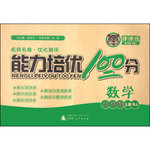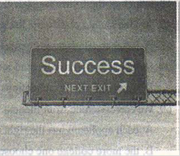题目内容
How to Become a Better Student
Maybe you are an average student. You probably think you will never be a top student. This is not necessary so, however. Anyone can become a better student if he or she wants to. Here’s how:
1. Plan your time carefully. When you plan your week, you should make a list of things that you have to do. After making this list, you should make a schedule of your time. First your time for eating, sleeping, dressing, etc. then decide a good, regular time for studying. Don’t forget to set aside enough time for entertainment. A weekly schedule may not solve all your problems, but it will force you to realize what is happening to your time.
2. Find a good place to study. Look around the house for a good study area. Keep this space, which may be a desk or simply a corner of your room, free of everything but study materials. No games, radios, or television! When you sit down to study, concentrate on the subject.
3. Make good use of your time in class. Take advantage of class time to listen to everything the teachers say. Really listening in class means less work later. Taking notes will help you remember what the teacher says.
4. Study regularly. When you get home from school, go over your notes. Review the important points that your teacher mentioned in class. If you know what your teacher is going to discuss the next day, read that material will become more meaningful, and you will remember it longer.
5. Develop a good attitude about tests. The purpose of a test is to show what you have learned about a subject. They help you remember your new knowledge. The world won’t end if you don’t pass a test, so don’t be overly worried.
There are other methods that might help you with your studying. You will probably discover many others after you have tried these.
How to Become a Better Student
|
General methods |
How to |
Advantages |
|
Plan your time carefully |
Make a list. Make a (71) ______. |
Force you to realize(76) ____ is happening to your time. |
|
Find a good place to study |
Free of everything but study (72) ______. |
You can (77) ______on the subject. |
|
Make good use of your time in class |
Listen to everything the teachers say. Taking (73) ______ |
Really listening in class means (78) ______ work later. |
|
Study regularly |
Go over your notes. (74) ______ new material. |
Help you (79) _____it better , remember it longer. |
|
Develop a good attitude about tests |
Don’t be (75) ______ worried |
Remember your new (80) ______. |
schedule
materials
notes
read
overly
what
concentrate / focus
less
understand
knowledge
【解析】
schedule 原词再现。根据这一部分的you should make a schedule of your time。
materials 原词再现。根据这一部分的ree of everything but study materials.
notes 原词再现。根据这一部分的Taking notes。
read 原词再现。根据这一部分的read that material。
overly 原词再现。根据这一部分的so don’t be overly worried.
what 原词再现。根据这一部分的realize what is happening to your time.
concentrate / focus 原词再现。根据这一部分的concentrate on the subject.
less 原词再现。根据这一部分的Really listening means less work later
understand 词义转化。根据这一部分的read that material will become more
Meaningful更有意义即更好的理解。
knowledge 原词再现。根据这一部分的They help you remember your new knowledge.

 课课优能力培优100分系列答案
课课优能力培优100分系列答案 优百分课时互动系列答案
优百分课时互动系列答案We often see dogs always put their tongues(舌头)out in summer. But 1 the dogs didn’t do so. Long long ago, the dog was very bad .He 2 did a good deed.
One summer day the dog 3 into a forest. 4 he saw the forest was beautiful and clean , a 5 idea came to him. Then he brought 6 dirty things to the forest and put 7 everywhere. What he did was 8 by a monkey who hid 9 a big tree. He didn’t tell anyone 10 the dog did because 11 did not know why the dog did so.
Several days 12 ,it got hotter and hotter , and the dirty things became rotten(腐烂).The air smelt 13 . Many animals fell ill. All the other animals became angry and tried 14 who had done it and punish him. The money knew 15 bad the dog was. So he 16 the other animals the truth. They catch up with the dog and 17 him eat all the dirty things and 18 the forest clean.
After that the dog 19 honest. To remember this, he put his tongue out in 20.
| 【小题1】 |
|
| 【小题2】 |
|
| 【小题3】 |
|
| 【小题4】 |
|
| 【小题5】 |
|
| 【小题6】 |
|
| 【小题7】 |
|
| 【小题8】 |
|
| 【小题9】 |
|
| 【小题10】 |
|
| 【小题11】 |
|
| 【小题12】 |
|
| 【小题13】 |
|
| 【小题14】 |
|
| 【小题15】 |
|
| 【小题16】 |
|
| 【小题17】 |
|
| 【小题18】 |
|
| 【小题19】 |
|
| 【小题20】 |
|

While applying to college may seem easy, getting in can be tough! When you apply for college, you will have to be honest with yourself and do a bit of research to find the right fit. Here are three steps to take when applying to colleges for the best chances at getting into the best college for you.
Step l: Making A List Of Colleges To Apply To
With over 6,000 colleges in the United States, the first step in applying to college is to do some research and make a college list .This process will be different for everyone. The number of colleges you apply to can vary, from applying to 1 school (not recommended) to 30 schools (not recommended),each applicant can choose how many colleges they apply to. Many limit the number because applications are accompanied by a fee.
Step2: Splitting The List Into Target, Reach and Safety Schools
In general, students will want to apply to three types of schools: Target, Reach and Safety schools. It is up to you how many applications you send, but a good mix would be more target than reach, and at least one safety. You will need to take your list, and now decide which are your top picks, which are attainable for you academically, which are affordable for you only with aid, and refine your broad list into a group of schools that gives you the best chance for success. Talk to an admissions counselor at your high school if you have questions about this.
Step 3: Completing and Sending Applications to Colleges
Once your list is complete you are ready to apply to college by completing and sending in applications! College applications take time to complete —you have to write essays, ask for recommendations and get test scores sent to schools—so stay organized! All colleges will require these types of application materials, so start thinking about these items well before October or December. Once you complete and send them, then you have successfully applied to college.
【小题1】It can be learned from the first paragraph that_____________.
| A.you should be cautious to pick up the right college |
| B.you don't have to think twice before applying to college |
| C.once you apply to a college, you'll be admitted to it easily |
| D.each applicant should choose the best college for their ideal |
| A.should consider more Safety schools |
| B.had better take your academy into account |
| C.are supposed to choose merely one most fit |
| D.are required to pick out more than 30 colleges |
| A.One should clarify the list according to one's abilities. |
| B.Refer to admissions counselor at high school if necessary. |
| C.One doesn't have to send his test scores to the intended college. |
| D.Teachers' recommendations are included in application materials. |
| A.each applicant has the right to apply to any colleges for free |
| B.the more college one chooses, the more successful he will be |
| C.applicants should send required materials before the deadline |
| D.safety schools are those that don't have so many requirements |
| A.how to succeed in life |
| B.how to apply to college |
| C.how to ask for information |
| D.how to do a research in college |
I decided early in my college years that I wanted to experience living abroad before entering in the real world. During my senior year, while most of my friends were interviewing for “real world” jobs, I was investigating how I could go work in a different country. At that early stage of my inquiry I was pretty open about where to go and what kind of work to undertake. My desire to live abroad was so strong that I was willing to do anything anywhere.
Soon I learned about BUNAC, a program that seemed to be designed precisely for student with such interests. BUNAC offers work visas ( 签证 ) for students or recent graduates to work overseas. Of the six countries available, I chose England because of the language and opportunities for employment.
Two months after I graduated from college I went to Britain. I traveled throughout Europe for six weeks before arriving in London. I got to London on August 24, 1997 with a work visa, but no job or place to live. I have to admit it was pretty scary! The day after I arrived, I experienced my first British holiday --- a Bank Holiday, a national holiday that everything is closed for the day. It wasn’t until my third day that I visited the BUNAC office and I learned all about living and working in Britain, paying taxes, getting health insurance, traveling around Britain, finding accommodations and most importantly, finding a job. I was most scared about finding a job since my financial resources were running low and I needed to get my pay soon.
It turned out that finding a job was not so difficult. The BUNAC program is very well known in London and many employers participate in the program. As a result there are many employers in many different fields to choose from. My job search began when I chose three different business employers and faxed them my resume (简历). That first week I had three interviews. I accepted my first offer working for Merrill Lynch International Bank. The Merrill Lynch office I worked at was in a beautiful, old building located two blocks from Buckingham Palace. The people were nice and the work interesting.
It was easy to adjust to life in London. And there is so much to see that after six months exploring I probably covered only half of what I intended.
【小题1】 When the author studied at college she decided _________.
| A.to enter the “real world” after graduation |
| B.to go and work in a foreign country |
| C.to settle in a different country |
| D.to find a job in the home country |
| A.it is a beautiful country and people there are nice |
| B.England is spoken there and it is easy to find a job |
| C.it is in Europe, not far from her own country |
| D.the BUNAC office is located there |
| A.getting a job | B.buying health insurance |
| C.traveling around Britain | D.finding a place to live |
| A.A Trip to Britain | B.What I Want to Be |
| C.Living in a Different Country | D.My Work Experience |
John H. Johnson was born in a black family in Arkansas city in 1918. His father died in an accident when John was six. He was reaching the high school age, but his hometown offered no high school for blacks.
Fortunately he had a strong-willed (意志坚强的) caring mother. John remembered that his mother told him many times, “Son, you can be anything you want really to be if you just believe.”She told him not to depend on others, including his mother. “You have to earn success, ”she said. “All the people who work hard don’t succeed, but the only people who do succeed are those who work hard.”
These words came from a woman with less than a third grade education. She also knew that believing and hard work don’t mean everything. So she worked hard as a cook for two years to save enough to take her son, who was then 15, to Chicago.
Chicago in 1933 was not the promised land that black southerners were looking for. John’s mother and stepfather could not find work. But here John could go to school, and here he learned the power of words—as an editor of the newspaper and yearbook at Du Sable High School His wish was to publish a magazine for blacks.
While others discouraged him, John’s mother offered him more words to live by.“Nothing beats a failure but a try. ”She also let him pawn(典当)her furniture to get the $ 500 he needed to start the Negro magazine.
It is natural that difficulties and failures followed John closely until he became very successful. He always keeps his mother’s words in mind.“Son, failure is not in your vocabulary!”
Now John H. Johnson is one of the 400 richest people in America—worth $ 150 million.
【小题1】John’s mother decided to move to Chicago because _____.
| A.his father died when John was very young |
| B.life was too hard for them to stay on in their hometown |
| C.John needed more education badly |
| D.there were no schools for Negroes in their hometown |
| A.didn’t believe in or depend on others |
| B.thought one could be whatever one wanted to be |
| C.believed one would succeed without working hard |
| D.thought no one could succeed without working hard |
| A.if you try, you would succeed |
| B.a failure is difficult to beat, even if you try |
| C.a try is always followed by a failure |
| D.no failure can be beaten unless you try |
| A.how John H. Johnson became successful |
| B.about the mental (心理的) support John’s mother gave him |
| C.about the importance of a good education |
| D.about the key to success for blacks |